Last week, I had the pleasure of attending the American College of Rheumatology’s “Convergence” conference, where I learned some of the latest rheumatology research and advancements in the field. This is a multidisciplinary conference, bringing together the American College...
Last week, I had the pleasure of attending the American College of Rheumatology’s “Convergence” conference, where I learned some of the latest rheumatology research and advancements in the field. This is a multidisciplinary conference, bringing together the American College of Rheumatology (the professional association for doctors) and the associated Association of Rheumatology Professionals (the association for allied health providers like me, an occupational therapist).
I also had the pleasure of connecting with many old friends, including fellow patient advocates, fellow allied health providers (occupational therapists, physical therapists, nurses and more), rheumatologists, patient centered nonprofits, and researchers. I’m excited to share some of my main takeaways with you, and please feel free to click through this 17 photo slideshow to catch a glimpse of the event.
My Goals in Attending Convergence
As an occupational therapist living with rheumatoid arthritis, and as the creator of the Rheum to THRIVE comprehensive self-management and support group program, my main goals in attending the conference were to discover new ways to improve quality of life for people with inflammatory arthritis (IA) based on the latest rheumatology research. Specifically, I wanted to:
Learn the latest evidence-based methods for reducing fatigue and pain, with a focus on non-pharmacologic or lifestyle methods (exercise, nutrition, stress management, sleep and rest, etc). Learn better ways to improve mental health for people living with IA. Connect, share ideas and build community with other passionate rheumatology enthusiasts / organizations, celebrate advancements in the field and nerd out in person about ways to improve patient care! Speak on two different panels at the event (one about meeting the psychosocial needs of people with inflammatory arthritis in the workplace, and one about ways to make an effective rheumatology themed podcast!).
I always leave these kinds of events feeling equal parts inspired, exhausted, thrilled and overwhelmed. Now that it’s been over for almost a week, I’m happy to share some of my biggest takeaways with you today.
Takeaway # 1: Exercise, Physical Activity & “Psychoeducation” can Reduce Fatigue For Rheumatoid Arthritis & Similar Conditions
Just add this to the list of paradoxes in the field of autoimmune arthritis: sometimes when your body tells you to rest, you might actually be better off expending energy (via exercise / physical activity) in the short term!
Yup, you guessed it: exercise continues to be an evidence based nonpharmacological intervention for fatigue. After facilitating many patient education and support groups, I understand how deeply intuitive this is, but it’s a super important tool in the toolbox when it comes to lifestyle interventions to improve quality of life!
I was beyond thrilled to discover that for the very first time, there’s an evidence based guideline for the non-medicinal management of inflammatory arthritis fatigue, which is based on the latest rheumatology research. The “2023 EULAR recommendations for the management of fatigue in people with inflammatory rheumatic and musculoskeletal diseases” pointed to the importance of exercise, psychoeducation and continued monitoring of fatigue in inflammatory arthritis.

The 2023 EULAR guidelines recommend:
Regular screening of fatigue (as in: your doctor asking about it at every rheumatology appointment) (Cheryl’s side note / soap box: why is this not already being done? I have no idea other than that providers tend to focus on joint pain / swelling because it’s more observable to their eye / “more objective,” regardless of whether the presence of joint pain or swelling functionally impacts the patient, and fatigue is seen as less objective / measurable, even though it can profoundly negatively impact function / quality of life) Offering tailored exercise and encourage increased physical activity Offer tailored psychosocial and psychoeducational interventions In the presence of fatigue, the provider should evaluate inflammatory disease activity
You can read the full literature review informing these recommendations, which echo the 2022 American College of Rheumatology guidelines for the integrative management of rheumatoid arthritis. In those guidelines, “consistent engagement in exercise was the most strongly recommended lifestyle factor/intervention, above any dietary / nutrition factor or even occupational therapy!
This certainly influenced my decision to hit the gym when I came back home from San Diego after the conference, but it’s important to recognize that increasing physical activity does not necessarily mean traditional exercise. Dance, yoga, and walking the dog are all great examples of ways to get your joints moving!
I was also interested to see A Longitudinal Study: The Benefits of Non-Pharmacological Approaches to Improve Self-Reported Pain, Stiffness, and Fatigue in Individuals with Musculoskeletal Disorders,” where the researchers found that: “for every 6-week virtual physical activity program, participants reporting at least one musculoskeletal condition experienced statistically significant decreases in pain intensity (p?0.01), stiffness (p?0.01), and fatigue (p?0.05).” I was particularly interested in this as it was delivered virtually and thus more accessible to patients than in person programs!
I was also quite interested to see this study: “Self-reported Levels of Physical Activity and the Association to Pain, Fatigue, Anxiety and Depression Among Patients with Idiopathic Inflammatory Myopathies.” The researchers surveyed patients and found a correlation between physical activity and depression, where people with higher physical activity levels showed less depression. The relationship between physical activity and fatigue was unclear, but in this study the people with worse fatigue showed a greater likelihood of having depression or anxiety, not surprisingly.
One last but important note on fatigue interventions in the rheumatology world: in “A Peer Health Coached Resilience-Based Energy Management Program Was Effective in Improving Fatigue and Other Outcomes in People with Systemic Sclerosis: Results of a Randomized Controlled Trial,” researchers concluded that a program facilitated entirely online by peers had a very positive effect in reducing fatigue in people with systemic sclerosis. This is fabulous news as remotely delivered psychoeducational programs are so much more scalable than in person ones, plus of course I was thrilled to see that it was effective!
Takeaway #2: The Patient Remains the CEO of Their Care (+ Patient Stories MATTER)
Dr Kaleb Michaud gave an incredibly powerful talk titled: “ARP Distinguished Lecture: From Then to Now to When – Perspectives from 45 Years of Patient Experience with Hope for Tomorrow.” He interweaved his personal experience growing up with juvenile idiopathic arthritis, which eventually led to 22 years of rheumatology research.
At one point, Dr. Michaud said that as a child, his doctors’ goal was to get him to merely survive to adulthood. It certainly underscores the systemic nature of JIA and the fact that it has so much more effects than simply “joint pain” (arthritis).

As Dr. Michaud’s childhood was only 30-40 years ago, to me this completely underscored how transformational modern medications are at the population level. When I volunteer at the Arthritis Foundation summer camps for kids with juvenile idiopathic arthritis now in 2023, I see kids whose goals are not just to maybe survive to adulthood, but whose goals are to live a live unencumbered by severe disability, pain and fatigue. As a patient educator, I’m often confronted with patients who are extremely medication hesitant, which I understand particularly during the pandemic. But I believe the historical perspective is crucial for patients to understand – the risks of the medications must be weighed against the risks of uncontrolled disease.
Additionally, I was deeply affected by how Dr Michaud explained this realization: “I didn’t realize this until much later in my life, that my doctor is not the one taking care of me “I’m the one taking care of me. They provided the tools for that to happen.” Through my lens as both a patient and occupational therapist / patient educator, this truly highlights the importance of patient empowerment and the development of self-management skills. Self-management, or the tools to manage the day to day of your condition, can absolutely be taught systematically, which I do in my Rheum to THRIVE program. Unfortunately so many patients are left on their own to figure out how to actually manage the day to day, I truly hope that there are more self-management groups and programs available to people in the future.

One last thought from this talk was simply how incredibly powerful the patient voice is. The conference is, understandably, chock full of in depth scientific presentations on the latest medications and developments at the cellular level, but as a “top-down” occupational therapist, I find myself most excited by developments that center the patient’s lived experience. I hope that in the future the patient voice is woven into the conference in more systematic ways, beyond the inclusion of voices like Dr. Michaud’s and mine who represent both a ACR / ARP member and patient perspective in one. The patient perspective posters in the poster hall are a great start!
Takeaway #3: Inflammatory Arthritis in the Workplace: Patients need Psychosocial Support (not just ergonomics)
In her poster “The Psychological Experience of Work for People with Inflammatory Arthritis (IA),” Joan Westreich (LWSW) presented the results of a qualitative study which showed “significant psychological impact related to IA patients’ efforts to maintain employment while coping with the challenges of their illness. This nuanced perspective is an important area of inquiry for a more holistic patient assessment and can inform multidisciplinary interventions to support IA patients at work” (citation: Joan’s abstract).
After completing in depth interviews of patients living with inflammatory arthritis, Joan and her team uncovered nine main themes of the challenges people with IA experience at work:

These themes are really consistent with what I’ve seen in the support groups I’ve facilitated as well. People living with inflammatory arthritis need support to navigate the complex psychosocial experience of navigating illness disclosure, internalized ableism, societal ableism and more!
I was honored to sit on a multidisciplinary panel to discuss these issues in depth, along with social worker Joan Westrich, social worker Adena Batterman, occupational therapist Dr. Janet Poole, Take a Pain Check founder Natasha Trehan (check out her interview on the podcast), and rheumatologist Dr Diane Lacaille.

I discussed how occupational therapy professionals can support the comprehensive needs of people with inflammatory arthritis at work, and focused on ways that many people end up falling in the “messy middle” where they are “too sick to work full time, too well to quality for disability.”
I also discussed the difficulty of securing accommodations for a fluctuating illness, as many others in the work environment often wonder “if you could do X yesterday, why can’t you do it today?”
Dr Lacaille shared helpful tips from her “Making it Work (TM)” program and all speakers discussed the complexity of the decision around whether or not to disclose one’s disability in the workplace. Overall we made the case that psychosocial stressors should be addressed by the multidisciplinary team and patients shouldn’t be left all alone to figure out how to thrive in the workplace.
Interestingly, in “Factors Associated with Work Productivity Among Individuals with Psoriatic Arthritis (PsA) and Psoriasis (PsO): The Role of Patient Reported Outcomes and Disease Severity,” researchers found that fatigue rather than joint pain accounted for “impaired work productivity” for people with PsA versus those with PsO alone – this is not surprising but important to document, as many people assume that the joint pain is the main factor that should be addressed or accommodated for in the workplace.
Takeaway # 4: Pharmacologic Therapies for Inflammatory Arthritis Also can Reduce Fatigue
Back to fatigue, one of my biggest priorities in attending the conference: I was encouraged to see this systematic review which points to the efficacy of many medications for rheumatoid arthritis and spondyloarthritis in reducing fatigue alongside joint pain and overall disease activity. The abstract includes a handy chart which showed that some medications were more effective for fatigue than others.
I’m hopeful that this can help patients and providers during the shared decision making process in the future, as I hear a lot of stories from patients who say their doctor appears unwilling or incapable of addressing the patient’s lingering fatigue.
Takeaway #5: Stages of Grief are *not* Sequential, and they are Experienced Throughout one’s Life (not just at initial diagnosis)
In session “14T123: A Thousand Tiny Deaths: Attending to Grief in Patients with Rheumatic Diseases,” Dr Courtney Wells (social worker and researcher) explained that the popular “stages of grief” from Dr Elisabeth Kübler-Ross were *never* meant to be linear. I really appreciated her “scribbled over” graphic explaining how the stages of grief are messy and overlapping and not sequential. This certainly has been my experience living with rheumatic disease, and the experience of many in my Rheum to THRIVE support groups.

I also really resonated with occupational therapist Rebecca Gilette’s perspective. She said, “I had to grieve that I couldn’t be the mom I thought I would be (due to rheumatoid arthritis),” yet though her grief she developed resilience and adapted to all the ups and downs of life with RA.
She also emphasized that grief is NOT just experienced upon initial diagnosis; it comes with each new “no,” new “I can’t do,” new health crisis, new loss of function , identity and role – it’s a “thousand tiny deaths” of the person you thought you would be before your diagnosis, and patients need support navigating it.
The speakers had some ideas for how providers can help patients navigate grief, including:
Validate the patient’s feelings Connect patient to members of interdisciplinary team who can help develop emotional coping skills (social work, counseling, OT) Ask: how can I help? Remind them“it’s ok not to be ok,” there’s no rush to get to an end point of being “over it”I enjoyed the chance to connect with Rebecca about this topic more at one of out multidisciplinary lunch meetings!

Takeaway #6: Cardiology and Rheumatology: a Match Made in Heaven
There’s a new interdisciplinary team on the block and it’s called “cardio-rheumatology.” In this session, the speakers provided an overview of an emerging field where cardiologists and rheumatologists work closer together to mitigate cardiovascular risk in RA. They discussed newly FDA-approved anti-inflammatory agent colchicine which reduced cardiovascular events by 30%.
It’s well documented that people with inflammatory arthritis are more likely to experience cardiovascular problems than the average person, but scientists are still figuring out what precisely to do to mitigate the risk since it often persists even when the patient’s inflammatory arthritis is well controlled. This is something I will keep a close eye on as I age, and it’s a major motivator for me to continue exercising as this is at least under my control!
Takeaway #7: Connecting in Person and Building Community is Important for Longevity and Burnout Prevention
Honestly, the biggest highlight for me of the entire experience was making new friends and reconnecting with old ones. There’s nothing like being surrounded by people whom are as passionate about patient care and patient education as you are. Every nonprofit booth I visited in the Expo Hall inspired me in some way, and left me feeling invigorated and a continued sense of dedication to the work I do with Rheum to THRIVE, the Arthritis Life Podcast and Arthritis Life as a whole.

Sometimes I see so many problems in the healthcare field as a whole, from insurance denials to pharmacy benefit managers, it’s easy to get anxious and frustrated and feel a “moral injury.” While developing my support groups, I have been careful to craft them to include a balance of venting about what’s wrong, along with focusing on what’s right or what’s still possible in terms of crafting a vibrant, meaningful existence within the confines of chronic illness.
At the conference, I was surrounded by so many warm, competent, caring professionals, nonprofit organizations and patients that it truly made me optimistic for the field as a whole. I saw so many people working tremendously hard to improve the quality of life for patients, from rheumatology researchers to nonprofit services. Experiences like this conference almost seem like an antidote to burnout among clinicians (at least super extroverted ones like me!). The inclusion of rheumatology themed bracelet trading was simply icing on the cake, bringing a splash of color, joy and fun to the occasion!


On a more micro level, there were so many small simple moments that brought joy to my heart. One of them was meeting Dr Jason Leibowitz, MD (Columbia University Medical Center) and his father prior to the podcast panel I spoke on, called “Going Viral: How to Achieve Podcast Success” (session #13M112). On the top right picture above, you can see Dr. Liebowitz’s father proudly taking pictures of him as he introduces our panel (I promise there were actually more people in the audience, it was just a big room!). It was so sweet to see the look of joy and pride on Dr. Liebowitz’ father! It’s hard to explain it in words, but I truly felt a sense of awe and celebration amongst the attendees at many of the talks, and it was fulfilling to be in the milieu of this grand event.
I was also inspired to meet and learn from Dr Puja Mehta, who delivered a resounding lecture called “Redefining Imposter Syndrome: Eliminating Bias and Transforming Culture.” She made a strong case that imposter syndrome (when someone feels less competent than they are) should not be solved at the individual level, whereby the person feeling imposter syndrome goes off to learn how to “develop resilience.” Rather, it should be addressed at the social / societal level, whereby we eliminate the biases that led to the person with imposter



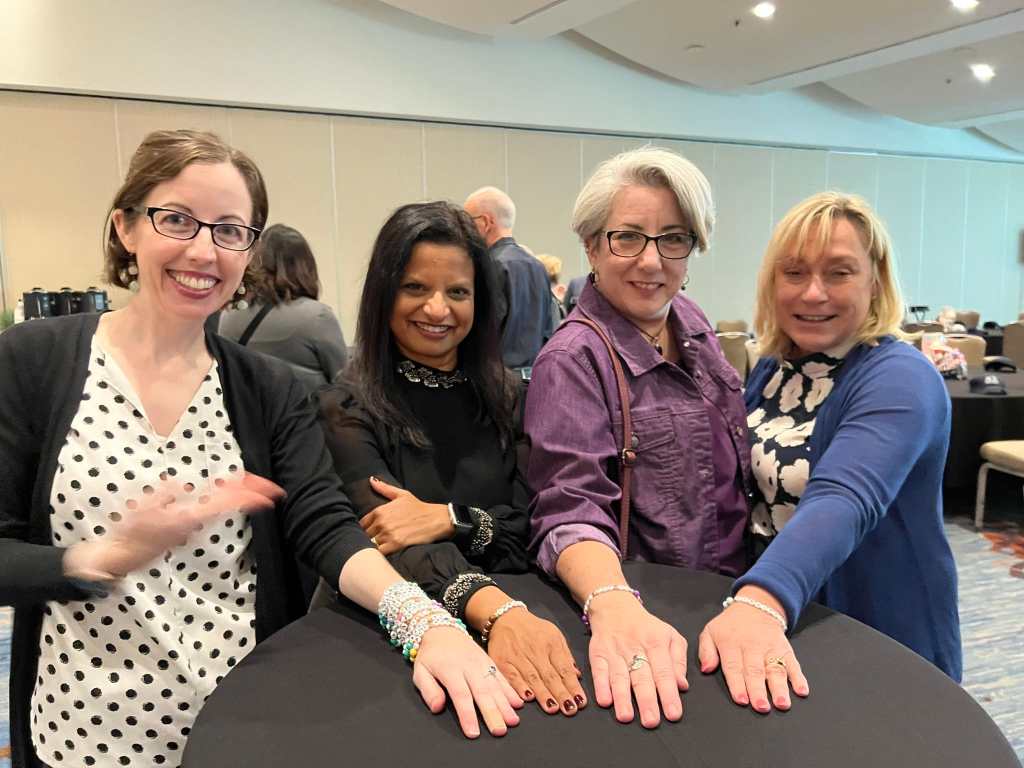 Association of Rheumatology Professionals connections!
Association of Rheumatology Professionals connections! Meeting up with Zoe R from CreakyJoints!
Meeting up with Zoe R from CreakyJoints! Checking out the famous Dr. Jean Liew, aka “Rheum Cat”s poster and exchanging friendship bracelets!
Checking out the famous Dr. Jean Liew, aka “Rheum Cat”s poster and exchanging friendship bracelets!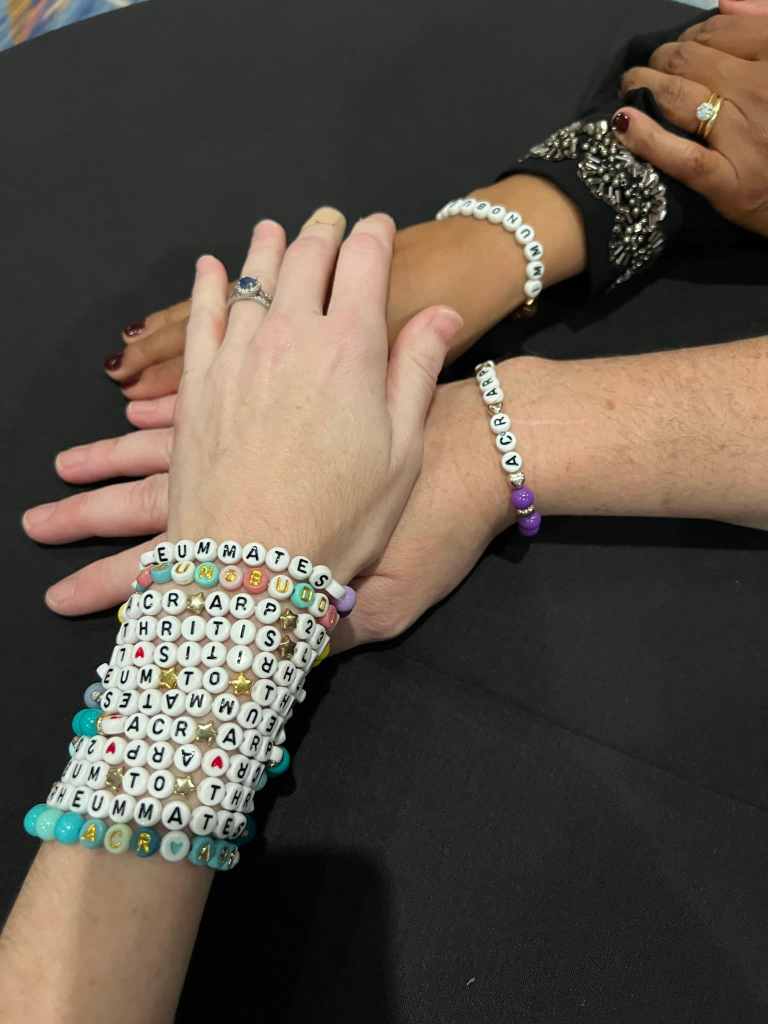 Trading rheumatology themed bracelets
Trading rheumatology themed bracelets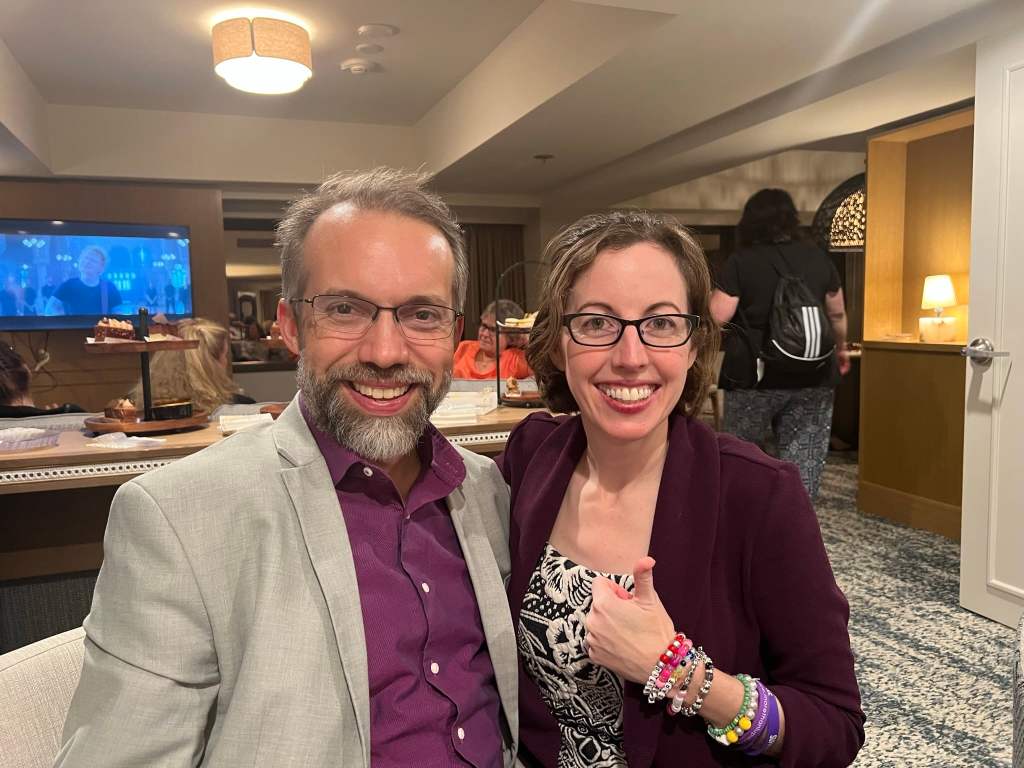 Getting to chat with Dr. Kaleb Michaud!
Getting to chat with Dr. Kaleb Michaud!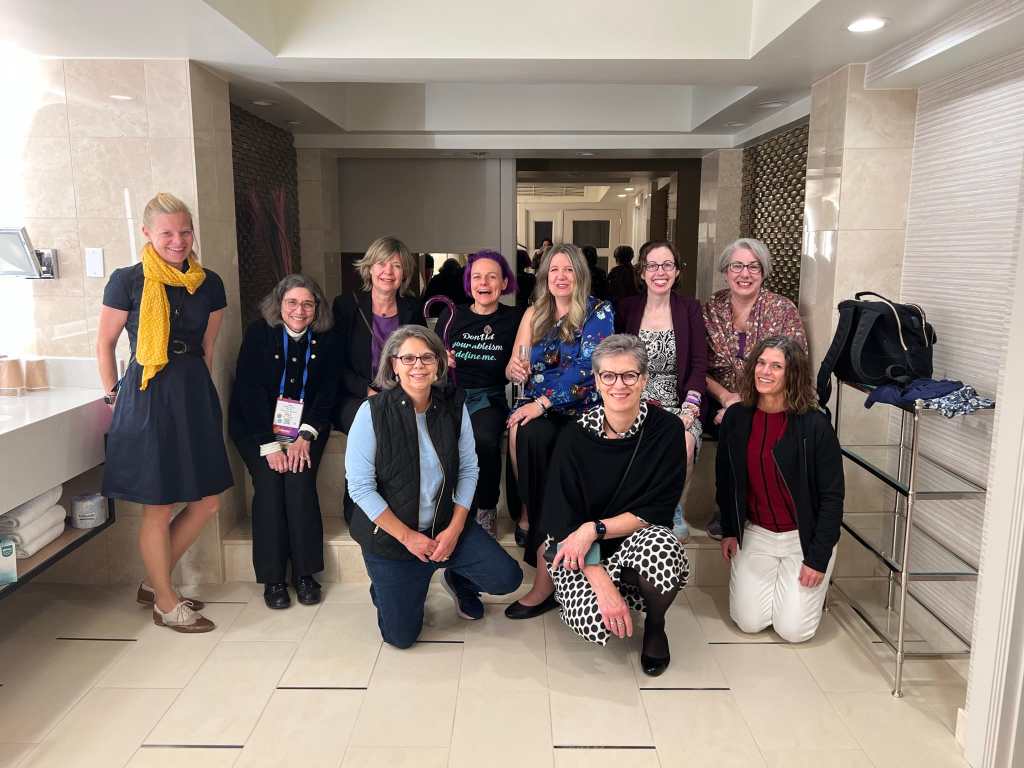 Analyzing the (inaccessible) bathroom and bathtub with association of rheumatology professionals members!
Analyzing the (inaccessible) bathroom and bathtub with association of rheumatology professionals members! Meeting Dr. Bharat Kumar, the editor of the Rheumatologist magazine!
Meeting Dr. Bharat Kumar, the editor of the Rheumatologist magazine! Dinner with my physical therapist, psychologist, nurse practitioner, physician assistnat and occupational therapist friends!
Dinner with my physical therapist, psychologist, nurse practitioner, physician assistnat and occupational therapist friends! Opening Ceremony with my RA friend Shelley!
Opening Ceremony with my RA friend Shelley! Connecting with my occupational therapy friend Rebecca Gilette!
Connecting with my occupational therapy friend Rebecca Gilette! Connecting with fellow patient advocate Natasha Trehan!
Connecting with fellow patient advocate Natasha Trehan! Connecting with more nonprofits
Connecting with more nonprofits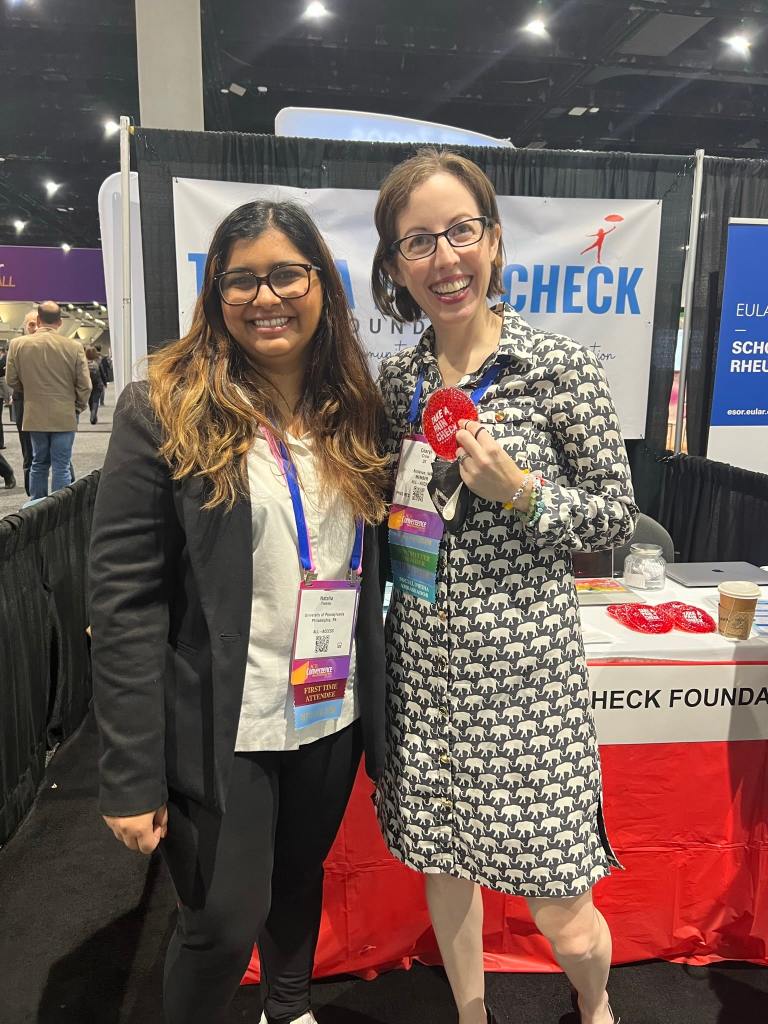 Checking out nonprofit booths like Take a Pain Check!
Checking out nonprofit booths like Take a Pain Check! Amazing Patient Perspectives Posters like Dana’s!
Amazing Patient Perspectives Posters like Dana’s! Shelly’s inspiring poster!
Shelly’s inspiring poster! Connecting with other patient advocates!
Connecting with other patient advocates! Making connections!
Making connections! Connecting with nonprofits!
Connecting with nonprofits! More bracelets!
More bracelets!






